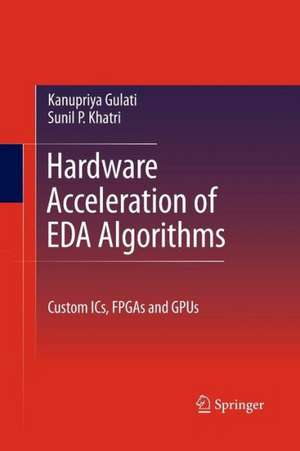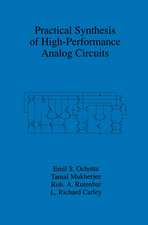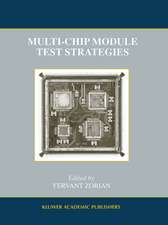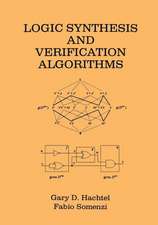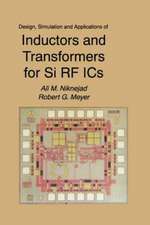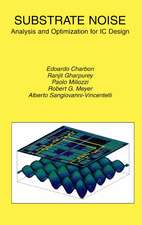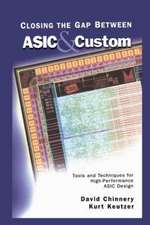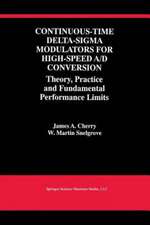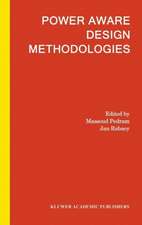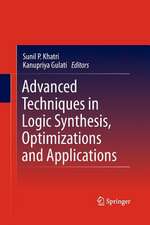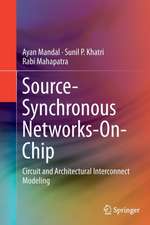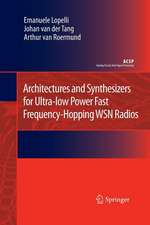Hardware Acceleration of EDA Algorithms: Custom ICs, FPGAs and GPUs
Autor Sunil P. Khatri, Kanupriya Gulatien Limba Engleză Paperback – 5 sep 2014
| Toate formatele și edițiile | Preț | Express |
|---|---|---|
| Paperback (1) | 831.80 lei 43-57 zile | |
| Springer Us – 5 sep 2014 | 831.80 lei 43-57 zile | |
| Hardback (1) | 641.71 lei 43-57 zile | |
| Springer Us – 6 apr 2010 | 641.71 lei 43-57 zile |
Preț: 831.80 lei
Preț vechi: 1014.39 lei
-18% Nou
Puncte Express: 1248
Preț estimativ în valută:
159.17€ • 166.60$ • 132.48£
159.17€ • 166.60$ • 132.48£
Carte tipărită la comandă
Livrare economică 31 martie-14 aprilie
Preluare comenzi: 021 569.72.76
Specificații
ISBN-13: 9781489983336
ISBN-10: 1489983333
Pagini: 216
Ilustrații: XXII, 192 p.
Dimensiuni: 155 x 235 x 11 mm
Greutate: 0.31 kg
Ediția:2010
Editura: Springer Us
Colecția Springer
Locul publicării:New York, NY, United States
ISBN-10: 1489983333
Pagini: 216
Ilustrații: XXII, 192 p.
Dimensiuni: 155 x 235 x 11 mm
Greutate: 0.31 kg
Ediția:2010
Editura: Springer Us
Colecția Springer
Locul publicării:New York, NY, United States
Public țintă
ResearchCuprins
Alternative Hardware Platforms.- Hardware Platforms.- GPU Architecture and the CUDA Programming Model.- Control Dominated Category.- Accelerating Boolean Satisfiability on a Custom IC.- Accelerating Boolean Satisfiability on an FPGA.- Accelerating Boolean Satisfiability on a Graphics Processing Unit.- Control Plus Data Parallel Applications.- Accelerating statistical static Timing Analysis Using Graphics Processors.- Accelerating Fault Simulation Using Graphics Processors.- Fault Table Generation Using Graphics Processors.- Accelerating Circuit Simulation Using Graphics Processors.- Automated Generation of GPU Code.- Automated Approach for Graphics Processor Based Software Acceleration.- Conclusions.
Textul de pe ultima copertă
Hardware Acceleration of EDA Algorithms: Custom ICs, FPGAs and GPUs
Kanupriya Gulati
Sunil P. Khatri
This book deals with the acceleration of EDA algorithms using hardware platforms such as Custom ICs, FPGAs and GPUs. Widely applied CAD algorithms are studied for potential acceleration on these platforms. Coverage includes discussion of conditions under which it is preferable to use one platform over another, e.g., when an EDA problem has a high degree of data parallelism, the GPU is typically the preferred platform, whereas when the problem has more control, an FPGA may be preferred. Results are presented for the acceleration of several CAD algorithms (fault simulation, fault table generation, model card evaluation in SPICE, Monte Carlo based statistical static timing analysis, Boolean Satisfiability), demonstrating speedups up to 800X compared to single-core implementatinos of these algorithms.
This book serves as a valuable guide on how best to leverage parallelism to accelerate CAD algorithms. It also presents a methodology to automatically extract SIMD parallelism from regular uniprocessor code which satisfies a set of constraints. With this approach, such uniprocessor code can automatically be converted to GPU code, allowing for significant acceleration. This approach is particularly useful since different GPUs have vastly different specifications, making the manual generation of GPU code an unscalable proposition.
In particular, this book:
Kanupriya Gulati
Sunil P. Khatri
This book deals with the acceleration of EDA algorithms using hardware platforms such as Custom ICs, FPGAs and GPUs. Widely applied CAD algorithms are studied for potential acceleration on these platforms. Coverage includes discussion of conditions under which it is preferable to use one platform over another, e.g., when an EDA problem has a high degree of data parallelism, the GPU is typically the preferred platform, whereas when the problem has more control, an FPGA may be preferred. Results are presented for the acceleration of several CAD algorithms (fault simulation, fault table generation, model card evaluation in SPICE, Monte Carlo based statistical static timing analysis, Boolean Satisfiability), demonstrating speedups up to 800X compared to single-core implementatinos of these algorithms.
This book serves as a valuable guide on how best to leverage parallelism to accelerate CAD algorithms. It also presents a methodology to automatically extract SIMD parallelism from regular uniprocessor code which satisfies a set of constraints. With this approach, such uniprocessor code can automatically be converted to GPU code, allowing for significant acceleration. This approach is particularly useful since different GPUs have vastly different specifications, making the manual generation of GPU code an unscalable proposition.
In particular, this book:
- Provides guidelines on whether to use Custom ICs, GPUs or FPGAs when accelerating a given EDA algorithm, validating these suggestions with a concrete example (Boolean Satisfiability) implemented on all these platforms;
- Demonstrates the acceleration of several popular EDA algorithms on GPUs, with speedups up to 800X;
- Helps the reader by presenting example algorithmswhich may be used by the reader to determine how best to accelerate their specific EDA algorithm;
- Discusses an automatic approach to generate GPU code, given regular uniprocessor code which satisfies a set of constraints;
- Serves as a valuable reference for anyone interested in exploring alternative hardware platforms for accelerating various EDA applications by harnessing the parallelism available in these platforms.
Caracteristici
Provides guidelines on whether to use GPUs or FPGAs when accelerating a given EDA algorithm, with validation by a concrete example implemented on both platforms Demonstrates the acceleration of several popular EDA algorithms on GPUs, with speedups from 30X to 800X Presents techniques in a way that the reader can use example algorithms presented to determine how best to accelerate their specific EDA algorithm Discusses an automatic approach to generate GPU code, given regular uniprocessor code Includes supplementary material: sn.pub/extras
